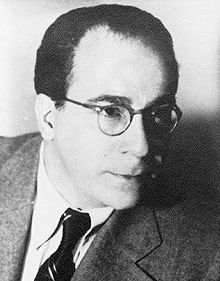
Oscar Lorenzo Fernández (November 4. 1897- August 27, 1948) was a Brazilian composer and leading academic, born of Spanish descent in Rio de Janeiro, Brazil, on November 4, 1897, and considered one of the most prominent and promising of the generation of Brazilian composers following the great Heitor Villa-Lobos. As a child he received music lessons from his sister. In 1917 he entered the Instituto Nacional de Música where he took harmony, counterpoint, and fugue lessons with Francisco Braga, Frederico Nascimento, and Henrique Oswald. In 1923, Nascimento was taken seriously ill, and Fernández was designated his temporary substitute in the chair of upper-level harmony, an appointment which became permanent two years later. In the early 1920s he helped found the Sociedade de Cultura Musical. His early style, from 1918 to 1922, was originally a form of Impressionism (i.e., the French-based style developed by Claude Debussy). Among his output of this period are the award-winning Noturno Op. 3 and Prelúdios do Crepúsculo Op. 15. However, during the 1920s, Fernandez abandoned writing music based on the European style and delved deeply into Brazilian folk traditions as the basis for a musical nationalism encouraged by the example of Villa-Lobos and the institution of a strongly nationalist government in Brazil.
The second period of Fernandez, from 1922 to 1938, was the period of his high production. Some of Fernandez’s most engaging works are mestizo in style, combining European and native Brazilian elements. Examples of his mature nationalism are Suite sinfônica, which makes use of material from two Bahia folksongs and a well-known known Brazilian lullaby; and Imbapara, using melodies collected from the Parecis Indians of Mato Grosso. Fernandez composed a three-act opera, Malazarte (1931-33), a nationalist work in both its subject matter and its musical content, to a libretto by José Pereira Graça Aranha, who adapted it from his own play of the same title. For the premiere at the Teatro Municipal, Rio de Janeiro, the libretto was translated into Italian. It is considered the first successful Brazilian opera of this type with the characters based on types found in traditional Brazilian stories.
In 1936 Fernandez founded the Conservatório Brasiliero de Música in Rio de Janeiro, which he directed until his death. From 1939 onward, he also served as Professor of Choral Singing at the Conservatório Nacional de Canto Orfeônico. In 1941 Fernández extracted a three-movement suite from Malazarte, which was titled Reisado do pastoreio (Pageant of the Manger). The last movement, “Batuque,” a Brazilian folk dance of African origin, became very popular and gained an independent musical life. The dance involves singing and dancing, with rhythms being marked by stamping, clapping and slapping, and drumming. (Some sources say that there are actually two different pieces called “Batuque”—one from the opera and the other from the suite.) His third period, from 1942 to 1948, was a synthesis of the previous ones, being more universalist than nationalist. He also composed one ballet named Amaya, two symphonies, five symphonic poems, two orchestral suites, one concerto each for piano and for violin, chamber music, about 80 compositions for piano, choral music, and 36 songs for voice and piano the best most-known of which is Toada pra Você. He composed music for a wide range of ensembles, becoming most noted for his vocal music, both songs and opera. He died on August 27, 1948, in Rio de Janeiro, Brazil.
The following work by Oscar L. Fernandez is included in my collection:
Batuque (finale from Reisado do pastoreio).
—material selected, adapted, and edited from several different sources
According to All Music (http://www.allmusic.com/composition/batuque-for-orchestra-mc0002355933), Reisado do pastoreio was a suite from 1930 which included Batuque. In 1941, he composed the opera Malazarte and the suite he drew from Malazarte included a different batuque. Cheers.
Yes, I saw that. Various sources that I checked differed on the origin(s) and number of the Batuque(s).
No matter how many Google page translations I’ve found, it’s still murky. Wikipedia has the opera itself composed from 1931 to 1933. A 1963 program guide for a New York Philharmonic concert (http://archives.nyphil.org/index.php/artifact/e5b4966c-98df-4d00-9ecf-66f8b936766f/fullview#page/1/mode/2up) places the Batuque in 1930, practically the same time as Malazarte. I think I trusted All Music Guide too soon.